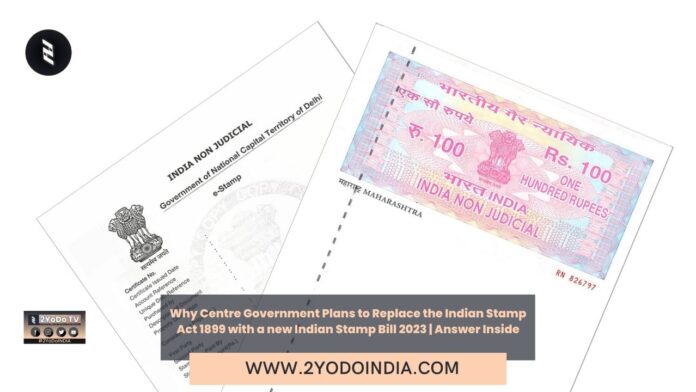Centre Government has propose repealing the Indian Stamp Act, 1899 and bringing in a new law for the stamp duty regime in India. On 17th January 2024, the Ministry of Finance invite suggestions on the draft ‘Indian Stamp Bill, 2023’ from the public.
What is Stamp Duty?
A stamp duty is a government tax, which is levied to register documents, like an agreement or transaction paper between two or more parties, with the registrar.
As the amount specified is fix based on the document’s nature or is charge at a certain percentage of the agreement value said in the document.
Stamp duties can be levied on bills of exchange, cheques, promissory notes, bills of lading, letters of credit, policies of insurance, transfer of shares, debentures, proxies and receipts.
Stamp duty accepted as valid evidence in a court of law, stamp duties are levied by the Centre but appropriated by the concern said within their territories under Article 268 of the Constitution.
Government Cuts Import Duty on Some Phone Parts to 10 Percent in Boost for Apple, Xiaomi
— 2YoDoINDIA News Network (@2yodoindia) January 31, 2024
for more news visit https://t.co/98KV4yIruC#2YoDoINDIA #Apple #Xiaomi #Samsung #Vivo #MobilePhones #India pic.twitter.com/GMP39IBQ4T
Why is New Indian Stamp Bill 2023?
As per the statement release by the Ministry of Finance, many provisions of the Indian Stamp Act, 1899 have now become “redundant” or “inoperative”.
For example, there is a lack of provisions for digital e-stamping and a lack of uniform legislation for all Indian states regarding stamp duties, the 1899 Act extend to 30 states and Union Territories combined while six states follow their own stamp acts and rules.
So, the ministry has propose repealing the existing Act and substituting it with new legislation to “reflect the present realities and objectives.”
Provisions of the Draft Bill
The draft Bill has introduce provisions for digital e-stamping.
“Electronic stamp” or “e-stamp” means an electronically generated impression denoting the payment of stamp duty by electronic means or otherwise, as per Section 2 (18) of the Bill.
There are also provisions for digital signatures.
Section 2 (17) of the Bill said that the words “executed” and “execution”, use for instruments, will mean “signed” and “signature” and include attribution of electronic records and electronic signatures, as define under the Information Technology (IT) Act, 2000.
The IT Act defines “electronic records” as “data, record or data generated, image or sound stored, received or sent in an electronic form or micro film or computer generated microfiche.”
While, digital or electronic signature refers to the authentication of any electronic record by a subscriber through an electronic method or procedure.
This draft Bill also proposes to raise penalties.
It seeks to increase the maximum penalty amount from Rs 5,000 to Rs 25,000 for contravening any provisions of the law and impose Rs 1,000 per day for repeated offences.
What is Indian Stamp Act 1899?
The Indian Stamp Act, 1899 is a fiscal or money-related statute that lays down the law relating to tax levied in the form of stamps on instruments recording transactions.
Under Section 2 of the Act, an instrument includes every document by which any right or liability is or purports to be, created, transferred, limited, extended, extinguished or recorded.
While, a “stamp” has define as “any mark, seal or endorsement by any agency or person duly authorised by the State Government, and includes an adhesive or impressed stamp, for the purposes of duty chargeable under this Act”.
Section 3 of the 1899 Act prescribes that certain instruments or documents shall be chargeable with the amount indicate in Schedule 1 of the Act.
These include bills of exchange or promissory notes.





